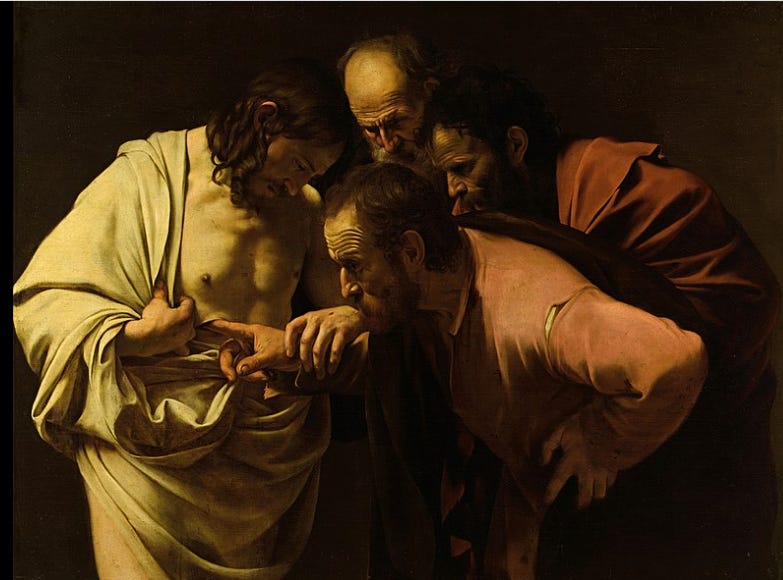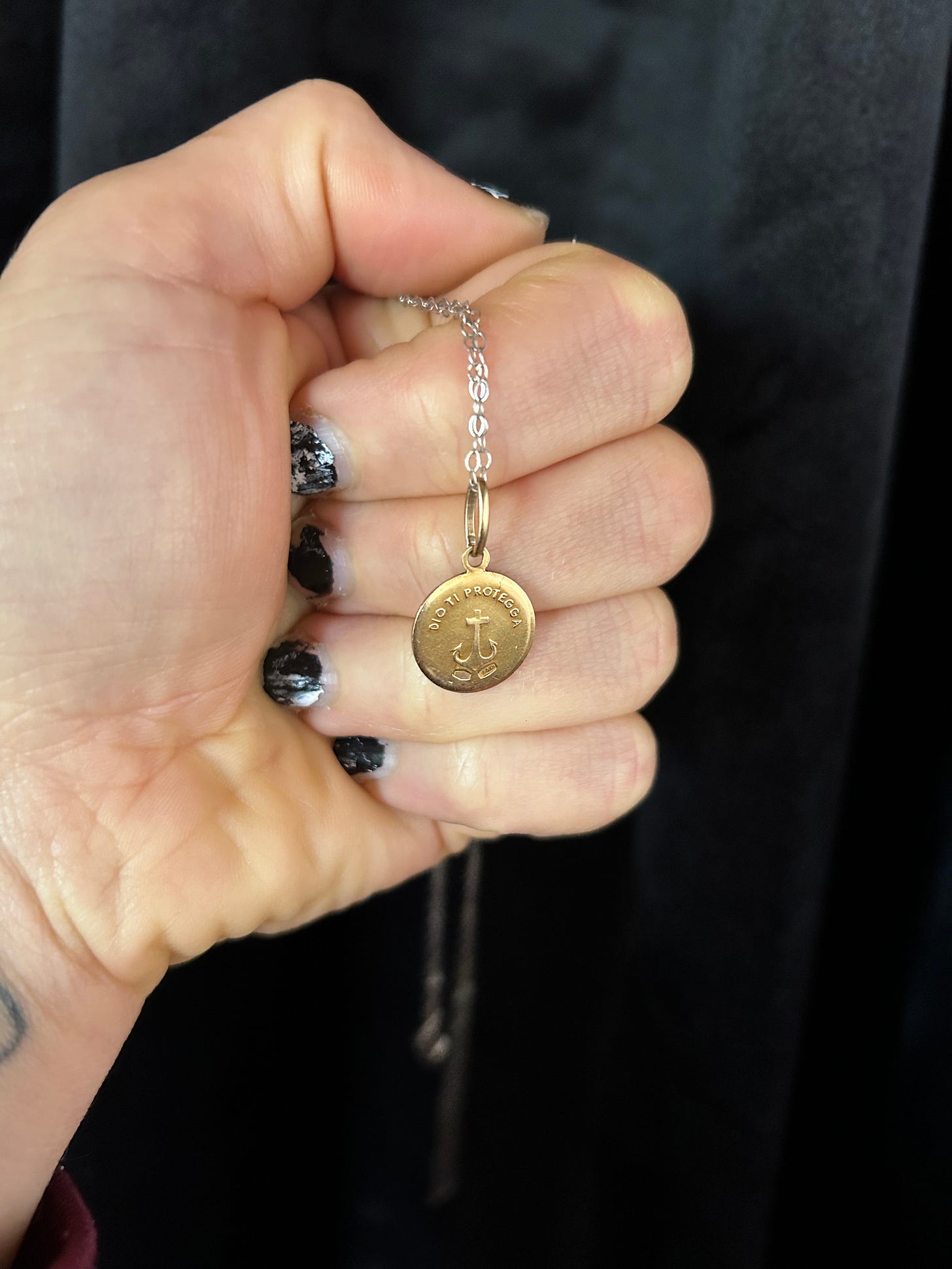In this multi part series I’m sharing a longer essay in chunks throughout the month of June about Saint Caterina, my mother as my first lover, vampires, and the idea of the black sheep. If you missed part 1, click here. Thanks for joining me in this.
This month’s craft talk will focus on techniques of the braided essay. The craft talk is open to paid subscribers. This month, that will be released as an audiocast through this platform. Upgrade to paid.
Black Sheep 1792 n, person of bad character, every flock has some. The color considered the mark of evil, frustration because the wool couldn’t be dyed. A member of a group or family who is regarded as a disgrace to it, the one who is the scapegoat for all the families sufferings and wrongs.
According to therapist Kevin Mimms, the family scapegoat is when a family places the responsibility for unresolved family issues on a child or family member. The scapegoat is viewed with suspicion. This can include intellect, appearance, reminders of previous scapegoats, making mistakes and wanting to protect other members of the family.
In the kind of Italian family I grew up in we had matriarchs, especially on my mom’s side. Grandma Natelli was one and it was her and Grandpa Natelli’s home in Patterson, NJ with its wild vegetable garden and outdoor kitchen that centered the family gatherings. They were loving and big and I remember a sense of wildness to them. Eating something from the vine or the aunts standing in an assembly line to jar the tomato sauce. When those two died my mom grieved more than I’ve ever seen anyone grieve for a grandmother. She lay flopped on the bed sobbing and I remember running to the window, looking up to the sky and praying that none of it would be true.
Even though I had been often afraid of Grandma Natelli, who I experienced as an ancient giant who only spoke to me in Neopolitan dialect, I loved the softness and comfort. A memory of sitting next to her on porch steps as she plucked dandelions and ate the flowers. Her holy metal with Jesus looking to heaven on one side and an anchor on the other with the phrase dio ti protegga catching the light.
Her daughter, Grandma Gallo became head of the family. Grandma Gallo was technically quite small, well under five feet and wore a big curly brown wig. As a child I found her stern and not very affectionate, at least not with me. I felt like she didn’t know what to do with me and she didn’t need to have much to do with me, there were so many other grand children who were funnier, thinner, prettier, or more aggressive, or more doting. What did it mean to be head of the family? She decided when we were getting together, who was invited, what each person should make or bring, who cleaned up afterwards (never the boys). Everything was arranged around what Grandma Gallo would think was best and she would sit, often quiet, at the head of the table. Her occasional laughter a prize that was won.
I never wanted to do the dishes and felt it didn’t make sense that the boys got to lie down after eating. I would organize some of the other cousins around my age to go hide, hoping that the adult women would just take over for us instead. But Grandma would find us and look at me sternly. I was a trouble maker, a lazy one. It is hard to describe the feeling, sitting in that basement hoping she won’t bother us and sneaking the fruit roll ups she kept in the pantry, knowing that there was something different and wrong about me and Grandma Gallo could see it. In fact I felt that my aunts could see it too, the uncles who married in, my cousins and maybe even my mom.
My mom was also lazy in their eyes, mischievous, clearly ate too many sweets in their opinion because of her weight and she would always bring it up with them first so that they couldn’t say anything—what diet she was on, how hard it was to lose weight. And the advice they would give: just don’t take as many desserts, Diana, stop eating pastrami, go for more walks.
Grandma Gallo, whose competency and steadiness was displayed by her excellence at math and the stock market and her disapproving eye somehow gave birth to only one daughter like her, the other three ditzy and chaotic.
And yet, my mom, even as the oldest, the one who should have been next in line was the ditziest. The one teased the most. Oh Diana, they would say. Sheesh. Ayiyi. The sisters shoulders bounced as they laughed, my mom’s nose would sweat.
I prayed with a passion. I talked to God in my head every morning, deciding to take a turn from the son and get right to the father. I prayed to feel the holy spirit. I took comfort in praying to The Virgin Mary even though she also terrified me, the thought of Bloody Mary appearing in the mirror. (And yes, I know, Bloody Mary isn’t about Virgin Mary at all, but isn’t it better if it is?) I imagined her soft, yet disapproving. Jesus was too terrifying in his hauntedness, of either not being understood, or the gore that I constantly saw him in the midst of. God was a beam of gold light, the holy spirit a sensation of confidence and fire. I wore a cross that had the upside down dove representing this genderless entity and never took it off for years. Rubbed my hand over it in the mornings as I worried.
Jesus was an outsider. He also didn’t do things right. He wasn’t very good at being a Jew and he wasn’t a typical Galilean—most staying in their hometowns their whole lives and sticking close to their families. He was as poor as you could get without being a beggar. Carpenter’s weren’t making chairs in 1st century Palestine. They were artisans likely making farm tools because Rome had instituted industrial agriculture and seized lands. You needed coins under Roman rule and fish and farming were the things that got those for you. Carts and the like? Not in such constant demand. I mean, once you had one you had one.
The person we are calling Jesus, because historians do have some confusion of whether Judas and Jesus were actually the same person, likely spoke in the language many of the Gospels were written, a pidgin Greek, Koine, which was the language of commerce. The word, koine, means common, like lowest common denominator. The language is sparing of poetry and quite direct.
“Those who hunger for justice are blessed since they will feast,” a more direct translation of the unceremonious language is quite different sounding from
“Blessed are they who do hunger and thirst after righteousness, for they shall be filled.”
The first is more the language of a people under colonial rule, especially those in the rural areas of Galilee who fought with fervent uprisings against Rome. In one case organizing a labor strike and in another action, surrounding Pilot’s house in demand that images of him be taken away from the gates of Jerusalem. He said if they didn’t disperse he would kill them all and so they stuck out their necks. Troubled, he agreed to take down the images and did not remove their heads.
And Rome was a brutal tax collector and colonizer. The crucifixion their common and heinous method of making examples of rebels. Aside from the gore of this death, which took days, you were left unburied—the greatest horror for the Jews of Palestine—whose bodies would be eaten by birds and wild dogs.
And Jesus wasn’t particularly clean—not in a dirty hippy way, Nazarenes of that time, with little access to fresh water weren’t prioritizing soapy cleanliness but like all Jews of the time, spiritual cleanliness. It was what marked them from their colonizers.
But amongst the things that were highly unclean, were lepers, touching a dead body, and giving birth. All of these required the defiled to remain outside of the community for a period of time—if not permanently like lepers— and until it was appropriate for mikveh, the ritual bath. And leprosy was any skin condition, that of course got worse from exposure and not being cared for by the community. And in the stories, Jesus touched all these people and Jesus also tended to the tax collector—who were the agents of the Roman empire. He was confounding to everyone: a rebel who was inconsistent, who spoke of a justice they all recognized, but also called himself God. Who could heal thoe exiled and also introduce them back into their communities. As Korb puts it “it’s possible to imagine that the magic of a miracle has less to do with breaking the laws of physics and more with breaking the laws of society.”
My mom kept tender photos of Jesus around the house: cuddling a sheep, or her favorite, one where his head was thrown back laughing. So alive and joyful and so different from the images I saw in church or in my school, every few feet a suffering, bloody, lean and cut Christ with his head looking up to God.
Jesus scared me for all of this, for how difficult he was to understand, for the fact that he made this sacrifice I didn’t totally get and that no one had really asked him too, from my perspective, except his dad. Abba, my mom told me he called God, meaning daddy or papa in Aramaic.
His eyes up to heaven like “these are your holes, Daddy.”
I wanted those holes, the stigmata. I prayed for them and I felt that if I had them, this difference I felt inside, these quiet talks I had with God in the morning, would be proved real and justified. The sense of injustice I felt as I slowly woke with young child’s consciousness to the world around me: that racism existed and was dependent on my whiteness, that the Earth’s temperature was rising, that murder happened, that people were unhoused and we couldn’t just house them or that people were dying of a virus they supposedly deserved including me as my fellow first graders told me I had AIDS, that I was a condom, that I was crabs. Unclean. That I didn’t want to wash the family dishes on Sunday dinners while the boys rested on couches. Give me the stigmata, kill me too, make everything better.
I squirmed in my seat learning about doubting Thomas, the moment when Jesus tells him to put his finger in all his holes and it was always the image of the vaginal hole between Jesus’s ribs, that Thomas’s hand could just slip in there the way I now guide a lover’s fist inside of me. They doubt that their large hands can fit and then I show them. How shameful, that Thomas had to touch Christ in this way in order to believe. But also how hot.
For Part 3 click here.






